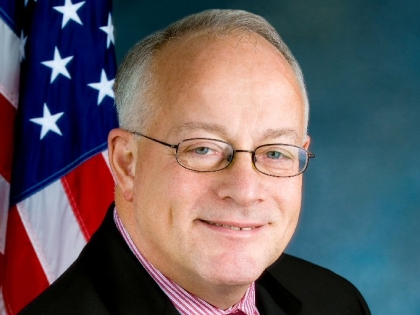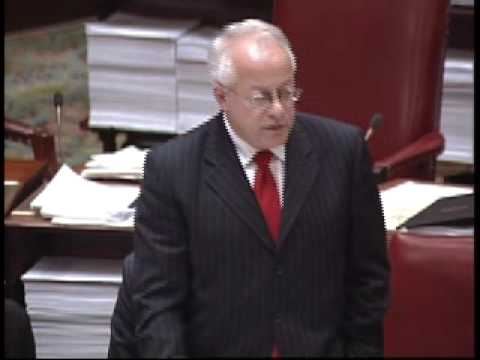
Volker Announces Senate Passage Of Health (medicaid) & Mental Hygiene Budget Bill
(Albany, NY) Senator Dale M. Volker (R-I-C, Depew) today announced Senate passage of the Health (Medicaid) and Mental Hygiene Budget bill that restores more than $762 million for hospitals, nursing homes and health care proposed to be cut the Governor, and takes aggressive steps to rein in the spiraling cost of Medicaid to local property taxpayers.
"One of my major goals this legislative session was to reign in the cost of Medicaid, which has contributed to local property tax increases for many counties in New York State," said Senator Dale M. Volker. "By capping Medicaid, instead of gutting the program and harming the elderly and the chronically ill, we can revisit issues still unresolved in a pragmatic, smart, and cost-efficient manner. Although some County Executives may cry that the current Medicaid agreement does not go far enough, I believe that their slash and burn ideas for reforming the Medicaid program could create a far greater financial dilemma for county taxpayers that they are currently facing.
The budget includes measures aimed at stemming the growth of Medicaid, including a sweeping cap on the program’s cost to local taxpayers. It also increases local accountability, implements an aggressive crackdown on fraud, and places additional emphasis on managed care.
Health care related highlights contained in the 2005-06 State Budget include:
Ÿ Medicaid Cap- State takeover of local Medicaid costs, beginning with the takeover of costs that exceed an annual growth rate, set as follows: 3.5 percent in 2006, 3.25 percent in 2007 and 3 percent in subsequent years. Together with the takeover of the Family Health Plus program, the cap will save local taxpayers over $3.3 billion annually when fully effective. In exchange for the State takeover, counties will be required to remit a set level of local revenues to the state, and will be subject to new accountability standards aimed at checking excessive local spending growth.
Beginning in 2008, counties will have two contribution options: under the first option, local governments can choose to remit to the State an amount equal to the capped spending plus three percent annual growth; and under the second option, local governments can choose to remit to the State a fixed percentage of their sales tax revenue equal to the SFY 2006-07 capped contribution. This measure will provide $121 million in local fiscal relief for SFY 2005-06.
Ÿ Family Health Plus - An accelerated state takeover of the Family Health Plus program for counties outside of New York City. Under the plan, the state would assume all local costs for the Family Health Plus program, effective October 1. The accelerated takeover of the program will provide $25 million in fiscal relief to local property taxpayers in SFY 2005-06. The Legislature also rejected the Executive’s proposal to increase co-payments and cut benefits available under the program.
Ÿ Prescription Drugs - A state "Preferred Drug Program (PDP)" and Prior Authorization requirement have been created. The plan ensures that doctors will have the final say in which drugs may be prescribed to patients and will result in $55 million in Medicaid savings.
Ÿ Senior Citizens - The budget includes $199 million for programs and services administered by the New York State Office for the Aging, a 6.1 percent increase from SFY 2004-05. The Budget also provides an additional $1 million for the Supplemental Nutrition Assistance Program (SNAP) and $1.2 million for the neighborhood Naturally Occurring Retirement Communities (NORCS) program;
Ÿ Improved Efficiency and Accountability - The budget integrates the Health Care Reform Act (HCRA) in the budget, making HCRA spending more transparent to the public and improving accountability. The budget also increases State efforts to combat Medicaid fraud with an estimated savings of $32.2 million.
Ÿ Merger of Disability-related Offices - The Commission on the Quality of Care for the Mentally Disabled is merged with the Office of Advocate for Persons with Disabilities, into the new Commission on Quality of Care and Advocacy for Persons with Disabilities.
Ÿ Health Care Facilities - The Budget restores $235.6 million in Medicaid reductions proposed by the Executive and reduces the 0.7 percent Gross Receipts Tax (GRT) proposed by the Executive to 0.35, and restores $124.3 million. It also restores $46.6 million in funding for outpatient mental health services and non-complicated detoxification services.
Ÿ Drug Prevention - The budget provides $524 million requested by the Executive for the State Office of Alcoholism and Substance Abuse Services and restores an additional $3.1 million for the New York City Department of Education’s Substance Abuse Prevention program and $1 million for drug prevention efforts in upstate communities.
-20-

